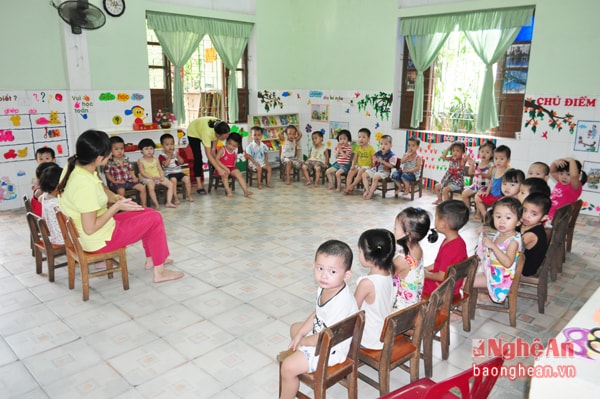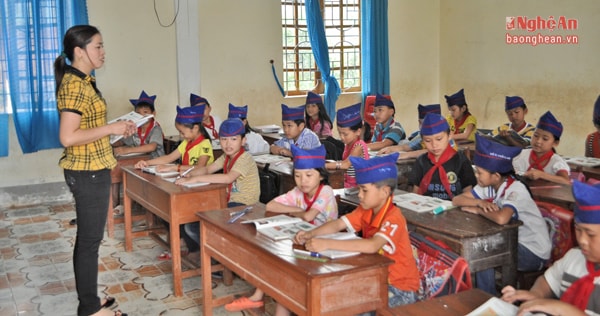New tuition fees - need to match people's income
(Baonghean) - The new tuition policy is being submitted by the Provincial People's Committee to the Provincial People's Council for approval to be applied in the 2016-2017 school year. However, there are still many concerns about the basis for determining the collection level for each level of education to suit the local socio-economic conditions and people's income.
Practical and legal basis
Thanh Luong Secondary School, Thanh Chuong District has a student population of about 350, consisting of 13 classes. Because the school is located in the mountainous area of Region I, the tuition fee is 20,000 VND/student/month. Thus, in total, each school year, the school collects about 60 million VND from tuition fees.
According to the regulations on tuition fee expenditure, 40% is spent on salaries for staff and teachers; the remaining 60% is spent on purchasing and minor repairs of facilities and 65% on other school activities, including training for excellent students, tutoring weak students, organizing exams, training, improving professional skills for teachers, business expenses, electricity and water bills, school security guards' salaries, etc.
 |
| Students of Dang Chanh Ky Secondary School (Nam Dan) review the formation at the opening ceremony. |
Mr. Le Nhu Huan - Principal of Thanh Luong Secondary School, said: With such a revenue level, it does not meet the spending needs of the school, especially activities to improve the quality of staff, improve the quality of teaching and learning of the school. Because in reality, the source from the budget for other spending activities in the school is very small; the revenue from socialization only serves to invest in facilities such as repairing classrooms, student desks and chairs, purchasing equipment, computers, projectors, etc.
Similarly, at Quynh Luu I High School, tuition fees are collected according to regulations at a rate of 70,000 VND/student/month. With about 1,600 students, the school collects an average of about 800 million VND in tuition fees each year. Of that, 40% is spent on salary compensation, equivalent to 320 million VND; 35% of 60% of total revenue, equivalent to nearly 170 million VND, is spent on facilities; the remaining 65% of 60% of total revenue, equivalent to over 300 million VND, is spent on school activities. Therefore, the source of funding for the school's professional activities is extremely difficult.
Teacher Nguyen Hai Thanh - Principal of the school shared: It is necessary to calculate enough for educational institutions, meeting the needs of minimum activities in schools. To do so, in addition to the State budget providing enough regular expenditure estimates for schools, ensuring 18% of the total budget is allocated to each educational institution, it is also necessary to adjust and increase tuition fees so that people can share with the State in the common concern for the cause of education and training.
From a legal perspective, the policy of socialization in educational, medical, cultural and sports activities is stipulated by the Government in Resolution No. 05/2005/NQ-CP, dated April 18, 2005; and the collection of tuition fees is considered a form of socialization, specifically stipulated in Decree No. 49/2010/ND-CP, and is now replaced by Decree No. 86/2015/ND-CP, dated October 2, 2015, regulating the mechanism of collecting and managing tuition fees for educational institutions in the national education system and the policy of exempting and reducing tuition fees, and supporting learning costs from the 2015-2016 school year to the 2020-2021 school year.
 |
| A class of 5-year-old children at Hung Dung Kindergarten (Vinh city). |
To create a basis for schools in the province to collect tuition fees in the 2016-2017 school year, the Provincial People's Committee has submitted a document on promulgating regulations on tuition fees and policies on tuition exemption, reduction, and support for learning costs in public educational and training institutions in the province from the 2016-2017 school year to the 2020-2021 school year.
Need to ensure suitability
Obviously, the proposal of the Provincial People's Council to issue a policy of increasing tuition fees by the Provincial People's Committee this time is completely reasonable, considering both practical and legal basis. However, in the process of researching the reality, we have recorded many opinions that determining how to reasonably increase tuition fees needs to be calculated and considered specifically.
According to the new tuition fee framework for preschool and general education stipulated in Decree No. 86/2015/ND-CP of the Government, it is divided into each region. Accordingly, the tuition fee framework that the Provincial People's Committee submitted to the Provincial People's Council for consideration and approval at the next session is divided into 4 regions. Specifically, for preschool level, Vinh city area has a collection rate of 235,000 VND/student/month; Cua Lo town, wards of Hoang Mai town, towns of plain districts is 205,000 VND/student/month; rural areas is 110,000 VND/student/month; mountainous areas is 50,000 VND/student/month.
For secondary school level, Vinh city area is 100,000 VND/student/month; Cua Lo town, wards of Hoang Mai town, towns of plain districts is 90,000 VND/student/month; rural areas is 50,000 VND/student/month; mountainous areas is 30,000 VND/student/month. For high school level and continuing education, Vinh city area is 150,000 VND/student/month; Cua Lo town, wards of Hoang Mai town, towns of plain districts is 140,000 VND/student/month; rural areas is 100,000 VND/student/month; mountainous areas is 50,000 VND/student/month.
Based on the comparison of the tuition fee framework prescribed by the Government with the new tuition fee proposal submitted by the Provincial People's Committee, Mr. Pham Huy Duc - former Chief of Office of the Department of Education and Training, said that the new tuition fee proposed by the province is too high compared to the economic conditions and income of the people. In addition, the division of regions to calculate tuition fees is also rigid.
For example, Vinh city has a common tuition fee, but in reality, the economic conditions and income of people in some suburban communes are still very low, not different from rural areas such as Hung Hoa, Nghi Duc, Nghi Phu... Agreeing with Mr. Pham Huy Duc's point of view, Mr. Le Tien Hung - former Director of the Department of Education and Training of Nghe An, said: Decree No. 86/2015/ND-CP of the Government clearly states that the tuition fee must be suitable to the economic conditions of the province and the lives of the people. Accordingly, the tuition fee framework set by the Government has a large fluctuation range, from 60,000 - 300,000 VND/student/month in urban areas; 30,000 - 120,000 VND/student/month in rural areas; 8,000 - 60,000 VND/student/month in mountainous areas. So, the economic conditions and living standards of Nghe An people compared to the whole country need to be accurately assessed to build a reasonable revenue level.
 |
| A class at Van Dien Primary School, Nam Dan district. |
If the economy and living standards of Nghe An people are at an average level, it means that the tuition fee is around 50% of the frame; if it is above the average level, it is at 60 - 70% of the frame... Increasing tuition fees is a correct and necessary policy, however, the Provincial People's Council needs to conduct research and consider carefully to decide on a reasonable collection level so as not to create difficulties for the people, while creating conditions for the education sector to operate.
From a specific perspective, teacher Le Nhu Huan - Principal of Thanh Luong Secondary School, Thanh Chuong District, said that if according to the new tuition fee, each student will increase by 10,000 VND/month, it is not much. However, for Thanh Luong people in particular and Thanh Chuong people in general, life is currently very difficult and they have to "bear" many contributions, especially contributions to build new rural areas, so any additional amount will create difficulties for them.
Ms. Nguyen Thi Huong, Ba Nghe hamlet, Thanh Giang commune (Thanh Chuong), currently has 3 children studying at 3 levels: preschool, primary and secondary school, confided: "Consumer prices have increased, but the agricultural products that we farmers produce have not increased. Now that tuition fees have increased, farming families have another expense, making things more difficult."
Ms. Nguyen Thi Kim Chi - Director of the Department of Education and Training, said: In terms of economic conditions, Nghe An is a province facing many difficulties. The income and living standards of the people are not high and there is a big gap between urban, rural and mountainous areas, especially the highlands.
Therefore, in the process of consulting on new tuition fees, the Department of Education and Training has focused on dividing tuition fees into 4 regions. On the other hand, although Nghe An is a province with difficult economic conditions, the quality of education in Nghe An is always at the top of the country, thanks to the great support and contributions of the people and parents through tuition fees and social contributions.
Therefore, the tuition fee in Nghe An in recent years has always been higher than other localities with similar conditions; and this new tuition fee increase also hopes that people will share with the budget when the province's conditions are still difficult to take care of the general education and training of the province.
PV Group

